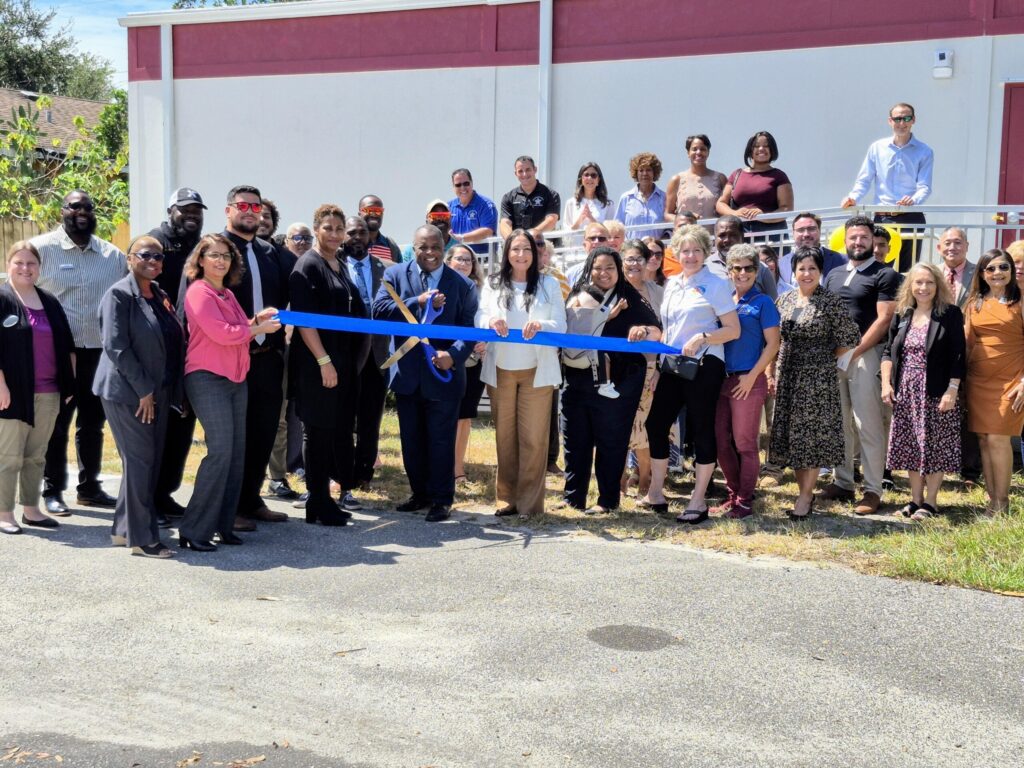
TAMPA, Fla. — Amelia Ramos recalls her oldest child’s first school experience after moving to the Grant Park neighborhood in 2018.
“It was not a good fit,” she said. “She lasted about four months.”
In addition to academics, Ramos cited safety as a big concern.
“You couldn’t even ride a bicycle down the street,” she said.
Ramos found hope after learning about Grant Park Christian Academy, a private school affiliated with the Faith Action Ministry Alliance. The nonprofit organization’s stated mission is “to strengthen neighborhoods through meaningful engagement, collaboration, and strategic partnerships.”
Grant Park Christian Academy prides itself on its record of providing strong academics and spiritually based character development. Ramos learned from the school’s principal about a state education choice K-12 scholarship program administered by Step Up For Students that would help cover the tuition.
With that, Ramos was sold.
Her daughter thrived at Grant Park and now attends a district high school. Her son and twin daughters now attend the private school, which serves 70 students in grades K-8.
“We love the school and the staff,” she said, adding that she appreciates the assurance of knowing that her children are safe when she leaves them at Grant Park Christian Academy.
“If only they had a high school,” she said.
Although there are no plans to add a high school, an expansion will soon more than double the school's capacity, located inside a gated property owned by a non-denominational church.
The project is just one example of a broader statewide trend resulting from the Florida Legislature’s passage of HB 1 in 2023. The landmark legislation made all K-12 students eligible for education choice scholarships regardless of their household income and gave families more flexibility in how they spend their students’ funds.
Putting parents in the driver’s seat supercharged the demand for more learning options.
In the 2023-24 school year, after Gov. Ron DeSantis signed HB 1, Florida saw the largest single-year expansion of education choice scholarships in U.S. history. That growth continued in 2024-25. Recent figures from the Florida Department of Education show that more than 500,000 Florida students were using some type of education savings account.
The expansions at Grant Park Christian Academy and other schools across the state, such as Jupiter Christian School in Palm Beach County, couldn’t come at a better time. The latest figures from Step Up For Students show that the number of approved private schools has surpassed 2,500. That figure doesn’t include a la carte options, including those now being offered by public schools. State figures show 41,000 parents received scholarships in 2024-25 but never used them. According to a survey by Step Up For Students, a third of the 2,739 parents who responded said there were no available seats at the schools they wanted.
The Rev. Alfred Johnson, who founded the ministry alliance and Grant Park Christian Academy in 2014, said the school is just one of the ways the ministry works to support and improve the neighborhood. A look outside the window once a month will show teams of alliance volunteers in neon yellow vests cleaning up roadside trash. Johnson estimates that over the past three years, the group has cleared 70 tons of garbage, including old mattresses, furniture, and household appliances.
Johnson and his volunteers regularly knock on doors and survey residents and business owners about community needs. They also host events; the annual Fall Fest offers families a safe and fun alternative to Halloween trick-or-treating.
“I know what they do to really make a change in this community,” said Hillsborough County Commissioner Donna Cameron Cepeda, a Republican who represents District 5 and the county at large. She said she had known Johnson for years before she ran for office. “You can see the lives, how they have been changed because of the environment they are able to be in now.”
She was among a group of 50 community members at a recent ribbon-cutting ceremony for a new 2,660-square-foot modular building that will open after crews add the finishing touches.
Those attending the event represented a broad swath of community leaders, from local law enforcement officers to staffers at the Temple Terrace Uptown Chamber of Commerce, who brought the ceremonial oversized scissors. A representative of the Hillsborough County Clerk’s Office also attended. So did a group of leaders and students from Cristo Rey Tampa Salesian High School, which has some Grant Park Christian Academy alums.
Hillsborough County Commissioner Gwen Myers, a Democrat whose district includes Grant Park, joined her Republican colleague in praising the alliance and the school. The two commissioners also presented Johnson with a commendation honoring his contributions to the community.
“Our children are our future leaders, and when we can give them the basic foundation of education, they are going somewhere,” Myers said. “Just remember where they got their start, right here in Grant Park. What you’re doing is being a true public servant. Thank you for your vision.”

A husband, father of six, and grandfather of 12, Johnson refers to the students at Grant Park as “our babies” and describes the school as a haven of safety and peace.
“We hardly ever have any fights here,” he said. The school day starts at 7:30 a.m. After-school care is available until 5 p.m. Grant Park also offers summer camp, tutoring, mentoring and career preparation programs for the community, where the median household income stands at $32,216, and 72% of households make less than $50,000 per year. About 20% of the population did not graduate from high school. Although the area still has crime, Johnson said it has decreased over the past five years. Educational opportunities such as Grant Park Christian Academy and adult education and training play a role in improving the area’s quality of life, he said.
Johnson said he has seen many students turn their lives around. He told guests about a boy who was put outside the room for disrupting class on his first day.
“I don’t like this school,” he snarled.
“Give us a chance,” Johnson replied. He encouraged the boy to focus on his studies and respect his teachers. “You’re going to be a great leader and a great man.”
By the second year, the boy’s attitude completely changed. Test results that year showed he had the highest reading score in the school.
“That’s just one of the stories,” he said. “We have a plethora of them.”
In 2022 I wrote a piece here at Next Steps declaring myself President of the “Religious Charter Schools Should Be Permitted, Mandatory and Non-existent” club. Every other group under the sun operates charter schools and infuses the curriculum with their point of view, which is fine because charter schools should be viewed as state contractors, as they are out here in the 9th Circuit. Moreover no one is ever forced to attend.
In that context, telling Lutherans etc. that they are some kind of menace to society that we must protect children from seems both bigoted and silly. It is also contrary to the principle of religious neutrality. Moreover, the equivalents of religious charter schools operate in Europe, and while it may not be optimal, it is hard to argue that such a prospect is catastrophic.
I also attempted to explain that the charter movement of today is not the movement of decades past. We’ve spent a couple of decades passing charter school laws perfectly designed not to open many actual charter schools. When states passed laws perfectly designed not to pass many charter schools, national charter groups sang the praises of the new laws.
This is not as strange as it sounds. This is not to say that it isn’t pathetic — it is in fact entirely pathetic — but it is not unheard of. Public choice economists long ago identified a Baptist and Bootlegger problem whereby sincere opponents (Baptists in this case are the unions and their groupies) and opportunistic incumbents (in this case charter management organizations with a legal team that can file a 900+ page application etc.) team up to throttle competition…err…I meant ensure quality charter authorizing.
Actually, I had it right the first time.
If you’ve been keeping half an eye on the Supreme Court for the last 20-plus years, you’ll know that the majority (delightfully) takes a dim view of discriminating against people or groups based upon their religious affiliations. I could be wrong (it has happened plenty of times before) but I’m thinking it is pretty clear how this case is likely to go.
Even if/when the high court allows religious charter schools, enthusiasts need to remember that this is what awaits even if you win the case:
The B and B alliance does not want m(any?) new charter schools to open, and both will be aghast at the idea of religious charter schools. I am not going to help them dream up insidious ways to discriminate against religious groups. If I did, it wouldn’t take me long to dream up five or six ways. On principle, I am with the religious charter school enthusiasts. Color me skeptical that this effort will prove a productive way to provide new schools and seats, but non-discrimination and an experimental mindset should prevail.
Enthusiasts should, however, understand the politics of what they are getting into.
Editor’s note: The NAEP will release 2024 fourth and eighth grade math and reading scores Wednesday. Buckle up!
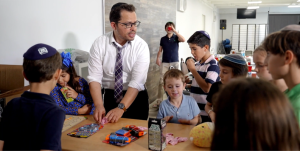
The number of Jewish schools in Florida nearly doubled over the past 15 years, boosted by parents using state school choice scholarships and the migration of families from New York, according to a new report from Teach Coalition and Step Up For Students.
Student enrollment between 2007-08 and 2022-23 rose 58 percent, from 8,492 to 13,379, while the number of Jewish day schools and yeshivas grew from 40 to 74, the report shows.
Over the same span, the percentage of Jewish school students using choice scholarships increased from 10 to 60 percent.
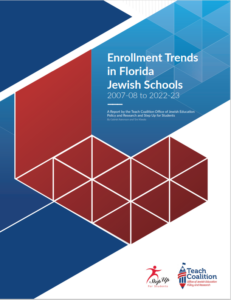 The growth of Jewish schools in Florida is historic and unmatched anywhere else in America. The analysis is also likely to understate the trend lines, given it does not cover the 2023-24 school year, the first year every student in Florida became eligible for a choice scholarship. (The data for 2023-24 is not yet available.)
The growth of Jewish schools in Florida is historic and unmatched anywhere else in America. The analysis is also likely to understate the trend lines, given it does not cover the 2023-24 school year, the first year every student in Florida became eligible for a choice scholarship. (The data for 2023-24 is not yet available.)
On a cautionary note, the report also points to increasingly pressing issues that could limit future growth – and not just for Jewish schools.
The vast majority of newer Jewish schools are on the smaller side, with fewer than 175 students. That’s not a function of parental preference, the report suggests, but the result of challenges schools face in navigating restrictive local zoning laws to find adequate and affordable facilities.
“With Florida’s existing Jewish schools at or near full capacity, more effort is needed to source suitably sized school buildings,” said Danny Aqua, director of special projects at Teach Coalition. “Without legislative and regulatory action to reduce the hurdles to opening new schools, the lack of school building space may throttle growth in Florida’s Jewish day schools.”
Full report here.
DORAL – When he begins his freshman year this fall at Boston University, Alvaro Saenz plans to major in biomedical engineering, a decision driven by his lifelong love of science and his desire to dedicate his life to helping people with special needs – such as his brother.
“It combines the best of both worlds,” he said.
Alvaro has always been fascinated with science. The desire to work with those with special needs comes from his younger brother, Jose Pablo, who, at a young age, developed a form of epilepsy that cannot be controlled by medication.
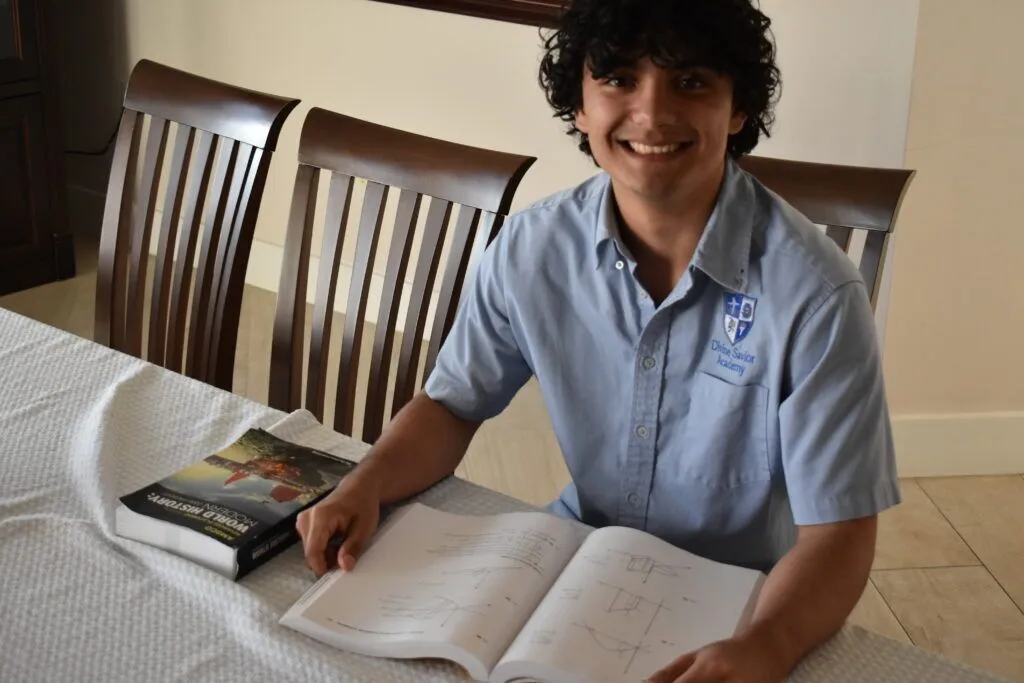
Alvaro will graduate this spring near the top of his high school class then study biomedical engineering at Boston University.
Alvaro was in second grade at the time. Since his parents, Ivan and Maria, needed to direct most of their attention toward Jose Pablo, who can suffer as many as nine seizures in a day, Alvaro decided to become as independent as possible. He helped more around the home and learned to do his homework without asking for help. No one had to tell Alvaro he needed to finish a school report on time or study for a test.
“It was tough on all of us,” Ivan said, “but especially on Alvaro.”
“But,” Maria said, “Alvaro never asked for help. Never.”
The result is a parent’s dream.
In a few weeks, Alvaro will graduate from Divine Savior Academy near the top of his class and with a QuestBridge National College Match scholarship. The scholarship pairs high-achieving high school seniors from low-income families with top universities across the country. It covers tuition and fees for four years.
Alvaro attends Divine Savior Academy (DSA) with the help of a Florida Tax Credit Scholarship, which is made possible by corporate donations to Step Up for Students. DSA is a faith-based, private pre-K-to-12 school in Doral, located a short walk from the Saenzes’ home.
Alvaro’s older sister, Sofia, is a 2017 graduate of DSA. She graduated last May with a law degree from Kent University in Canterbury, England, and is looking for a career in publishing.
Jose Pablo attends Divine Savior School (DSS) on Florida’s Family Empowerment Scholarship for Students with Unique Abilities. Divine Savior School is located next to DSA and opened four years ago. Jose Pablo, now in the tenth grade, was one of the first students.
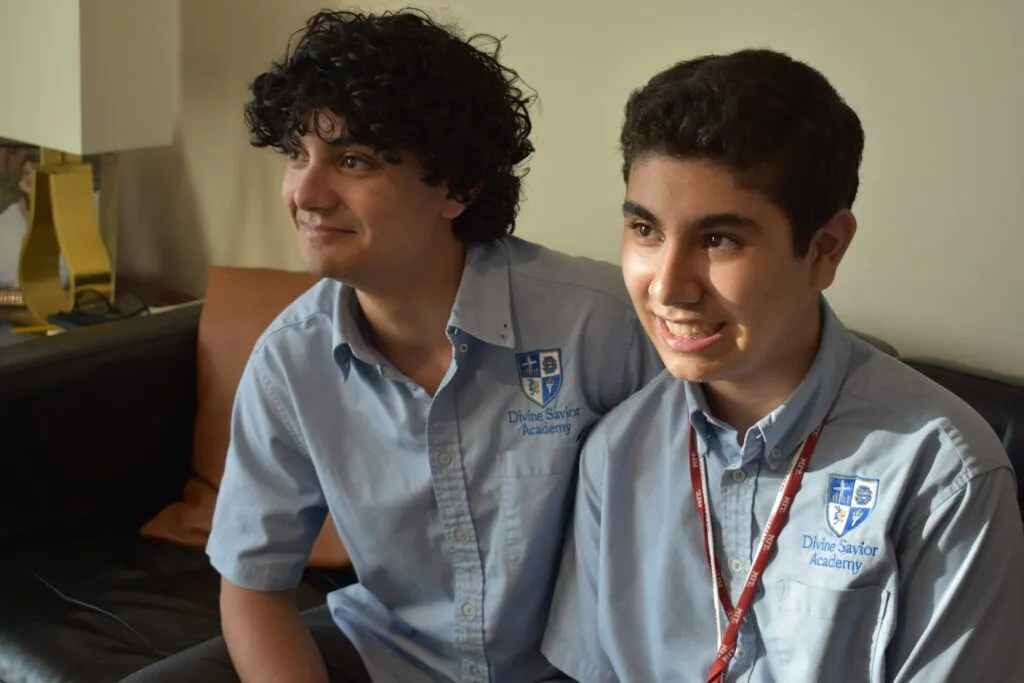
Watching his brother Jose Pablo (right) battle seizures nearly every day is one of the reasons why Alvaro wants to study biomedical engineering.
“The scholarships are a huge blessing,” Ivan said. “We can’t even begin to say how much these scholarships mean to us. My two oldest children have bright futures because of them, and with Jose Pablo, we found a place where he can thrive.”
The family immigrated from their native Bogota, Colombia in 2000, because Ivan and Maria wanted a better life for their children. That began with a faith-based education. Ivan and Maria felt DSA was the best educational setting for their children.
“They have bright futures because of Divine Savior Academy,” Ivan said.
Sofia said the academy prepared her for life after high school.
“The college counselors we had there were incredible,” she said. “Having that guidance helped me prepare to be very organized, very meticulous in college. The teachers themselves were all incredible. I have so many fond memories of so many teachers. They really dedicated themselves to making sure we had a proper education and prepared us for the world outside of our high school.”
Sofia attended Drexel University in Philadelphia for one year. But the high cost of tuition sent her to England, where a college education isn’t quite as expensive.
Alvaro was in middle school at the time and sensed the financial burden a college education could place on his family.

“When I saw what my sister went through with college, I started seeing all the difficulties the finances would be, I knew that I had to maintain a certain academic level so that I would be able to get a scholarship and achieve everything I wanted to,” he said.
In fact, Alvaro often wondered how his parents were able to send him to DSA.
“I was kind of glad that my parents had told me about the FTC scholarship,” he said. “It removed the sense of burden and gave me a great sense of appreciation honestly, that this whole time I was getting the support from this program.”
Since its inception in 2003, QuestBridge has awarded more than 14,500 scholarships, including 2,242 in 2023. Applicants must have an unweighted grade point average of 3.94 and can apply to as many as 15 schools involved in the QuestBridge program.
In addition to Boston University, Alvaro applied to Johns Hopkins University, the Massachusetts Institute of Technology, Columbia University, the University of Pennsylvania, and Yale University. He was matched with Boston University and received the acceptance email on Dec. 6.
“We were so relieved,” Maria said. “I could finally breathe.”
“The scholarship is a step forward towards reaching my dreams,” Alvaro said.
And that dream is to help find a treatment to help ease Jose Pablo and others like him wage their daily battle against epilepsy.
“I’ve spent pretty much my whole life helping him through this,” Alvaro said, “and it’s left me with this sense of duty to help others with similar conditions.”
The first quarter academic awards ceremony at Grace Christian School was coming to an end, and Lynette Thomas had yet to hear her daughter’s name called.
Briana Thomas had enrolled at the pre-K-to-8 faith-based private school in Ocala as a sixth-grader that August and had aced every test. Lynette thought it was odd Briana hadn’t been recognized.
Not really.
There was still one more award to go.
High Honor Roll for kids with all A’s.
A name was called. Briana Thomas.
“I cried,” Lynette said. “I was not expecting that.”
Lynette enrolled her three children at Grace Christian School at the beginning of the 2021-22 school year with the help of Florida’s Family Empowerment Scholarship for Educational Opportunities (FES-EO), managed by Step Up For Students.
“It's a big help because if I didn't have this scholarship, it would be something that I absolutely couldn't afford,” said Lynette, a single mom who works in catering.
“It’s a humongous blessing, and (my children) don't take it for granted. They always tell me, ‘You know, we're so blessed to have received that scholarship.’ And Briana is always like, ‘Mom, I'm gonna make you proud.’ ”
Briana, now an eighth grader, plans to attend Trinity Catholic High School in the fall. She is already researching colleges and has talked about a career as a veterinarian, doctor, or photographer.
Lynette calls Briana “my little Einstein.”
“It’s like her mind is on steroids,” Lynette said.
“I’m one of those students who strives and thrives to get straight A’s,” Briana said. “My grades are very important because the higher grades you get, the higher you achieve in life. I try my very hardest to get the best grades because that’s what colleges are looking for.”
When asked what she likes most about her school, Briana said, “The dedication, passion, and commitment to education shown by the teachers. I appreciate them.”
This made her mom chuckle.
“Normally kids are afraid to speak with the principal and assistant principal, but they are super nice and have built a relationship with every student,” Lynette said. “They’re the best.”
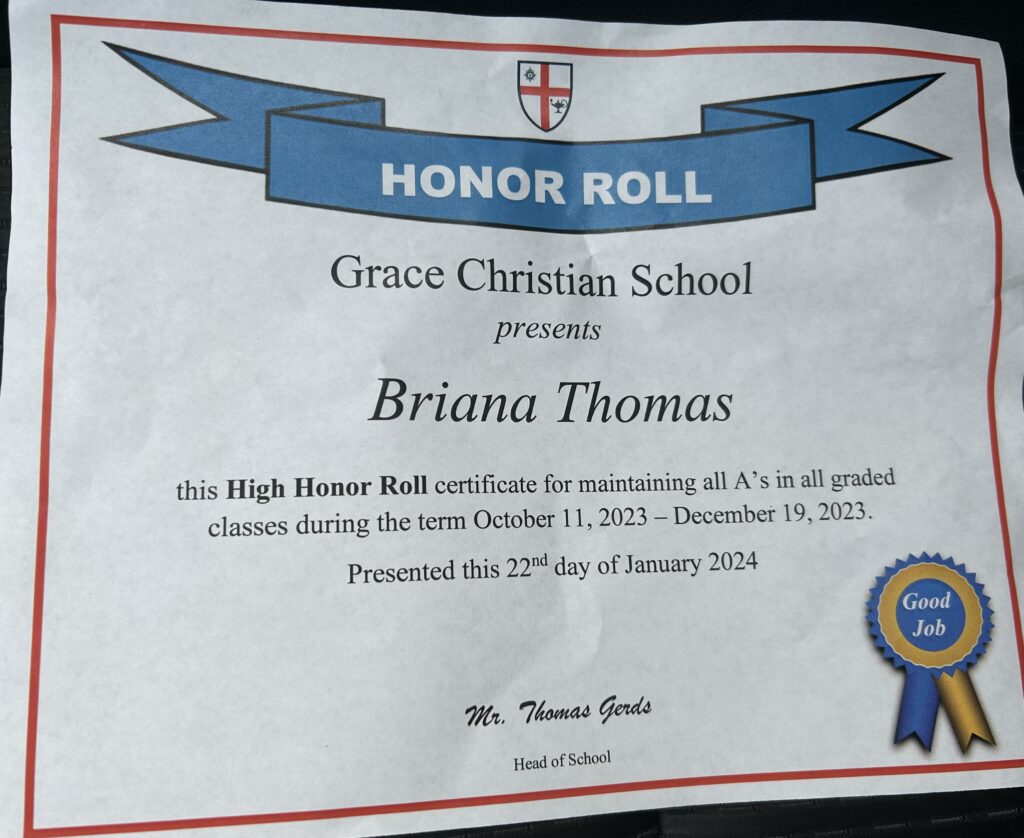
Lynette admitted she had more than a little anxiety when she enrolled Briana, Omari (now in the fifth grade), and Madison (second grade) at Grace Christian. It has everything she was looking for in a school: a faith-based curriculum and the favorable teacher-to-student ratio that come with smaller class sizes.
But …
“I was scared to death,” Lynette said. “I didn’t know if my child would excel in private school.”
That fear was quickly put to rest. Briana has been on the honor roll every quarter. That’s 10 and counting. Not surprisingly, she’s a member of the National Junior Honor Society.
“She’s a very bright child,” said Debbie Bruni, Grace Christian’s Admissions Director & Events Coordinator.
Omari and Madison are also doing well academically.
Briana (percussions) and Omari (euphonium) are in the band at the Riley Arts Center in Ocala. Briana also plays basketball, volleyball and swims.
Lynette’s children attended their district school before the COVID pandemic. She tried homeschooling during the pandemic but admitted it wasn’t ideal. After learning about the FES-EO scholarship, she began a tour of private schools in the Ocala area.
Grace Christian was the last school on her list. Bruni was the tour guide, and it was her advice that sold Lynette.
“I tell everybody who visits, please go visit other schools because you have to make this decision with your heart, not your head,” Bruni said. “It’s one of the biggest decisions you're going to make for your child's life. They're here most of the day, and we are a family here. We all work together. We love and nurture these children and bring them up in Christ and you’ll see your child blossom.”
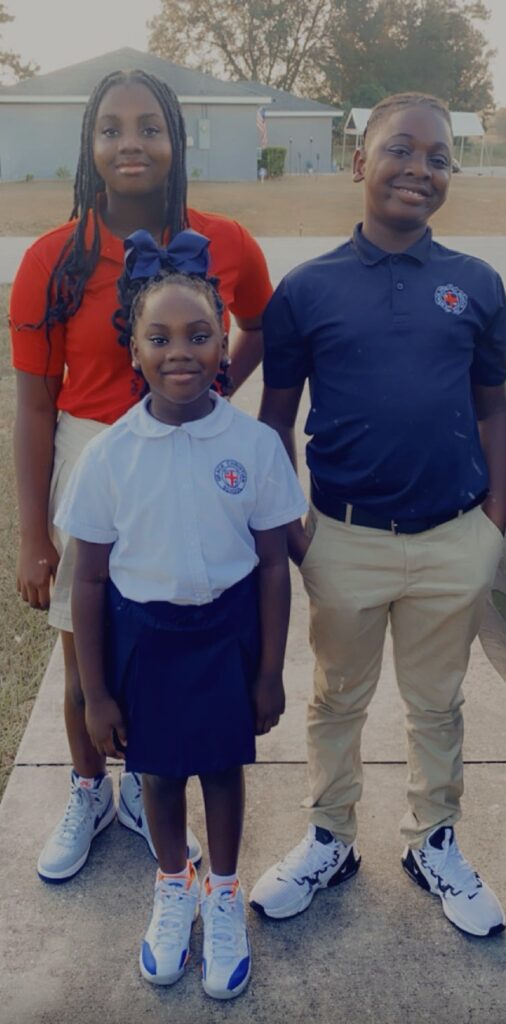
All three of Lynette's children are thriving academically at Grace Christian.
Lynette was sold.
“The staff at Grace Christian is amazing,” Lynette said. “Sometimes I cry, and I call them, and I'm like, ‘Thank you guys so much for taking excellent care of my babies.’ ”
Sometimes Lynette makes the staff cry, like the morning after she drove the children to school and told Bruni that during the ride, they were laughing and singing hymns.
“They want to go to school,” Lynette told Bruni.
“We hear that a lot,” Bruni said. “We help to bring them up as better people.”
Briana said she entered Grace Christian with the typical nerves that come with attending a new school. Will I make friends? Will I be able to handle the work? Much like her mother, that anxiety didn’t last long.
She was invited to sit at a table for lunch during her first day. Friendships were made.
Briana said she loves the faith-based atmosphere at school. Students pray every day and attend church once a week. She has received the school’s Light of Christ Award every year.
She also likes the class trips – Washington, D.C. in the sixth grade and camping in the seventh.
And she likes being challenged academically.
“Sometimes her friends invite her out and she tells them, ‘No. I have to finish my homework,’ ” Lynette said. “If it wasn’t for the scholarship, she would never get to go to that school. It’s amazing to see her do so well.”
Editor's note: This story is published in celebration of National School Choice Week, which runs Jan. 21-27.
In the early 1980s, a young educator and pastor named Frederic Pinkney received a vision of a school where all children got the attention they needed to succeed.
Years later, in 1996, he left his Duval County district classroom to co-found Joshua Christian Academy and make that vision a reality in Jacksonville. The school’s journey from scrappy start-up to enduring community institution in the northwest corner of Florida’s largest city traces the 25-year arc of education choice in the Sunshine State, which reached new highs this school year thanks to the largest-ever expansion of educational options in America’s history.
Joshua Christian Academy opened its doors three years before Jeb Bush became Florida’s 43rd governor and led the charge for school choice scholarships in the Sunshine State, which was then called the nation’s most ambitious program.
“People paid for their children to go,” Pinkney recalled.
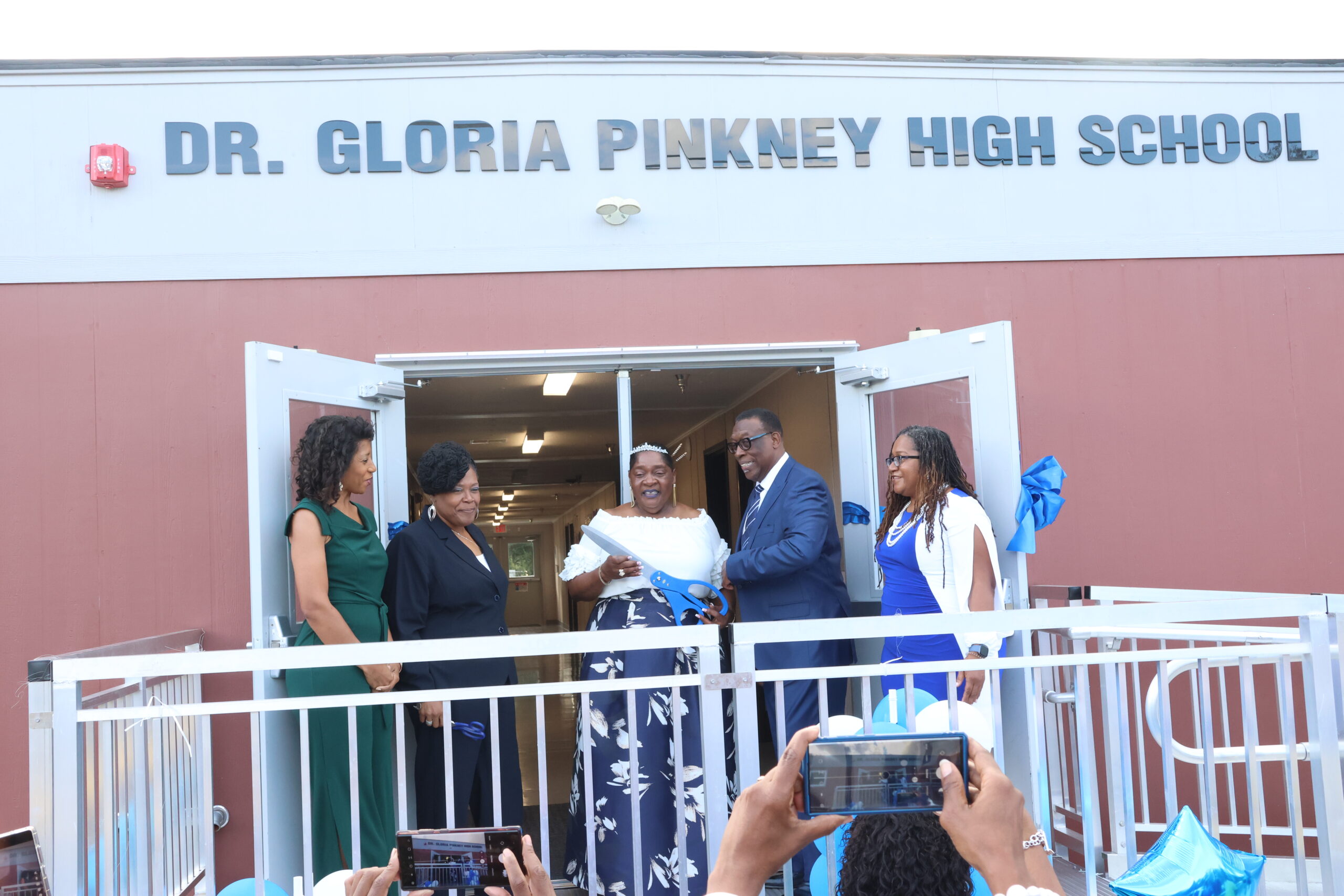
School leaders celebrate at a ribbon cutting for Joshua Christian Academy's new building, named for co-founder Dr. Gloria Pinkney. Photos courtesy of Joshua Christian Academy
The community was hungry for options. As a public-school teacher, Pinkney enjoyed helping students learn, but he also saw plenty who were struggling.
“I saw some kids were slipping through the cracks,” he said. He saw kids being passed along to the next grade without mastering the skills necessary to be promoted. He also saw kids, especially Black boys, disciplined more harshly than white kids for the same infractions.
He said he knew there had to be a better way.
Before the school officially opened, Pinkney served as the sole employee. That included getting an occupancy certificate from city hall, where staff kept saying no.
“For three months, I went to city hall every day, four or five times a week,” before a director signed off on the request. “I never backed down.”
With approvals finally in hand, Pinkney opened the school with six students. His wife, Gloria, a 19-year elementary school educator, left her job and helped her husband run the school. Church members volunteered for non-instructional tasks. Pinkney’s sister made lunches for the children. The Pinkneys' daughter, Lisa Harris, also played a key role.
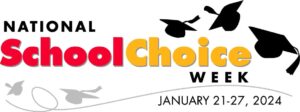 In the early years when there was no state funding source, Joshua Christian Academy experienced uneven growth and at one point had to eliminate the upper grades due to low enrollment. (Those grades were later restored as younger students got promoted.) However, the school managed to grow its elementary school enrollment as word spread about the school’s high academic standards, smaller class sizes and commitment to personalized education. With the state legislature’s passage of the Florida Tax Credit Scholarship Program in 2001 and later the Family Empowerment Scholarship Program in 2019, enrollment began to increase rapidly.
In the early years when there was no state funding source, Joshua Christian Academy experienced uneven growth and at one point had to eliminate the upper grades due to low enrollment. (Those grades were later restored as younger students got promoted.) However, the school managed to grow its elementary school enrollment as word spread about the school’s high academic standards, smaller class sizes and commitment to personalized education. With the state legislature’s passage of the Florida Tax Credit Scholarship Program in 2001 and later the Family Empowerment Scholarship Program in 2019, enrollment began to increase rapidly.
Last year’s passage of HB 1 provided the rocket fuel that sent enrollment to 400.
“It turned night into day,” he said. “It changed the culture.” He said the school’s phone rings constantly with calls from parents who want to send their kids there.
“It’s probably ringing right now,” he said.
 Such growth has allowed the Joshua Christian Academy, home of the Eagles, to offer a comprehensive athletics program and provide transportation to and from school with its fleet of seven shuttle vans and three traditional school buses. Pinkney said some students live at least 20 miles away, though the average distance is about 10. Three years ago, Joshua Christian Academy graduating class members received more than $1 million in higher education scholarships, a point of pride for Pinkney.
Such growth has allowed the Joshua Christian Academy, home of the Eagles, to offer a comprehensive athletics program and provide transportation to and from school with its fleet of seven shuttle vans and three traditional school buses. Pinkney said some students live at least 20 miles away, though the average distance is about 10. Three years ago, Joshua Christian Academy graduating class members received more than $1 million in higher education scholarships, a point of pride for Pinkney.
He credits this achievement to his daughter, Lisa Harris, who is now the school’s executive director and has taken over the school’s day-to-day operations as Pinkney stepped back to work with the church.
Pinkney is also quick to credit his wife, whose many years of experience as an educator helped provide a foundation of excellence from the beginning. In November, Joshua Christian Academy cut the ribbon on a new building to house the upper grades. Its name: “Dr. Gloria Pinkney High School.”
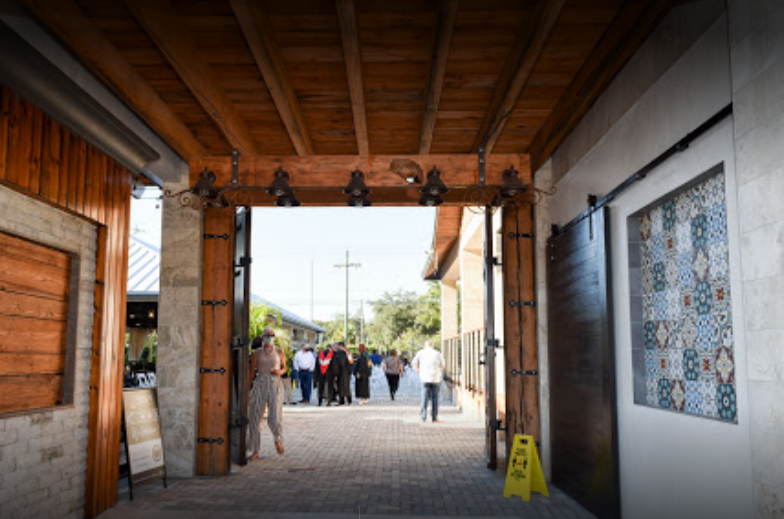
Cristo Rey Tampa Salesian High School, included in a national network of 38 Catholic high schools serving more than 12,000 students, offers a Corporate Work Study Program that allows students to earn 60% of their tuition through employment.
A vacant 75,000-square-foot office complex in Orlando, Florida, built as a school for interior design, will reopen in two years with a different kind of interior design as its mission – one that seeks to sharpen teenagers’ minds and instill the Catholic faith in their hearts.
Leaders of a group formed to open a Cristo Rey High School in the central Florida area recently announced the purchase of the complex, made possible by Hanover Capital Partners, a local development company led by the Orosz family.
According to a news release, the Oroszes’ paid $7 million for the property that sits near a lake at 6039 S Rio Grande. The family donated the property to the Cristo Rey Network, which has 38 schools in 24 states.
In Florida, Cristo Rey has a campus in Tampa and last year opened one in Miami, which is led by an alumnus of the original school founded in Chicago in 1996. Translated in English as Christ the King, Cristo Rey is a network of private Catholic schools with a work-study model that makes a Catholic education accessible to students from low-income families.
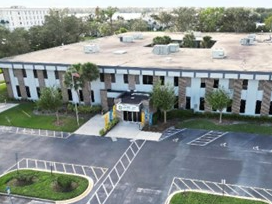
The Orlando property, most recently used as a training center for the Army Reserves, will require about $5.4 million in renovations before it welcomes its inaugural freshman class of 125 students in 2025.
The Orlando property, most recently used as a training center for the Army Reserves, will require about $5.4 million in renovations before it welcomes its inaugural freshman class of 125 students in 2025. The school will add a grade each year after that to ultimately serve 500 students in grades 9 through 12.
“The bones of the school are very good, as it was originally planned as a school for design,” said Russ Allinson, the project’s feasibility study chairman. “However, we have extensive plans to renovate it and prepare it to be a thoroughly modern high school.”
Those plans started to evolve when several community members began independently reaching out to the Cristo Rey Network. School leaders then helped them connect and the group began a feasibility study.
Allinson said school supporters were surprised to learn that Orlando, which has 400,000 registered Catholics in its nine-county diocese, had only one Catholic high school in the city, Bishop Moore. Chesterton Academy, a classical school, describes itself as “grounded in the Catholic faith” but is an independent school and not listed on the diocese website. The closest Catholic high school after Bishop Moore is Santa Fe Catholic High School, 52 miles west in Lakeland.
“For a city the size of Orlando, it is unusual to have only one Catholic high school, and we understand there is more demand than there are places for students,” Allinson said. “Many families that want their children to attend a Catholic high school are unable to afford or gain admission to Catholic high schools in central Florida.”
Soon after the group formed, a member reached out to Bill Orosz, who engaged immediately in the process. With the research complete and the need established, the next step was to find a building. The sale of the Rio Grande property closed on Feb. 9.
“It’s really just an Orosz family philanthropic endeavor,” Andrew Orosz, vice president and general counsel with Hanover Capital Partners, told GrowthSpotter following the sale. Hanover is led by Bill Orosz and his three sons, Andrew, Matthew and Steve.
Cristo Rey is best known for its unique model of pairing academics with work experience offered by community partners that allow students to work five days a month for all four years of high school. The work-study, along with state K-12 education choice scholarship programs, makes it possible for student whose families could not afford tuition to attend a private school. The work underwrites about 60% of the tuition.
It also gives students valuable experience as they pursue college or a career, said Amanda Livermore, a Cristo Rey employee and director of the feasibility study.
“When they finish their four years in high school, they have a resume of experience that is unique to students their age,” she said. “Furthermore, Cristo Rey has a track record of advancing students who may be behind in their schoolwork and preparing them for college.”
(For a list of partnering organizations, click here.)
The school will offer sports, initially through partnerships with other area schools and organizations. Leaders plan to add a gym to the campus in a few years. The first class will help select the school mascot.
For now, Cristo Rey Orlando is conducting a national search for its president. The Cristo Rey leadership model has a president at the top, with a principal and a community work study director.
Once the school is up and running, it will employ about 70 administrators, teachers and staff members.
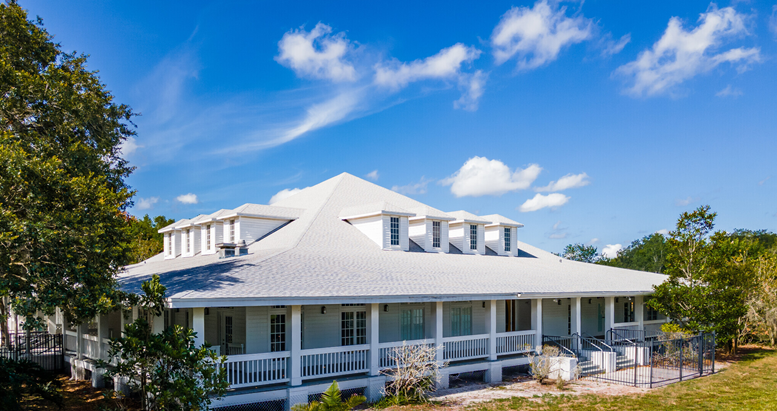
Tampa Torah Academy, a private Orthodox Jewish school, will provide a challenging and well-rounded, age-appropriate curriculum emphasizing critical thinking, problem solving and independent research in diverse bodies of Judaic and general studies.
Abundant sunshine, greater opportunities for remote work, affordable housing, and school choice scholarships have attracted many young Jewish families from the Northeast to Florida. Now, a group from Queens, New York, is moving to the Tampa Bay area to open Tampa Torah Academy, a private Orthodox Jewish school.
The school will be led by Rabbis Ariel Wohlfarth and Yirmiyahu Rubenstein, who will serve as deans of the academy. The school will serve students in preschool through eighth grade, though leaders hope to add high school grades if enough parents express interest.
The school will be housed at 5209 Tampa Palms Blvd. in a rambling white building with dormer windows and an inviting wraparound porch that formerly served as a day care center. Renovations are nearly complete, and leaders expect to start classes by the end of this month.
The timing for the school is optimal, as more than 39,700 Jewish people live in the Tampa Bay counties of Hillsborough, Pinellas and Pasco, according to 2020 figures from the Public Religion Research Institute, a nonprofit, nonpartisan organization dedicated to independent research about the intersection of religion, culture and public policy.
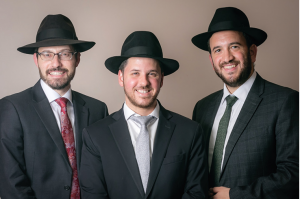
From left to right: Rabbi Ariel Wohlfarth, Rabbi Yirmiyahu Rubenstein, Rabbi Yossef Stulberger
Rubenstein explained that interest for the school came from parents in Tampa who contacted the Rabbinical Seminary of America, also called Yeshivas Chofetz Chaim, and Orthodox families seeking to leave New York for Florida. He said eight Orthodox families will be coming down from New York with him.
The school is part of the services provided by the Kollel, a group of dedicated Jewish families who live, learn, and teach in the community. The outreach center will also offer classes for adults on topics related to Judaism as well as community events.
Tampa Torah Academy is an affiliate of the Rabbinical Seminary of America, of which both Rubenstein and Wohlfarth are graduates. The organization is connected to similar Torah academies throughout the country, including in Orlando and South Florida.
Rubenstein said the school day will begin with religious education followed by secular studies such as math, reading, science and social studies in an Orthodox environment that will include kosher meals and a calendar that allows students and staff to observe Jewish holidays.
Rubenstein, a husband and father of four young children, explained that Jewish day schools are not luxuries for families, who need their children to receive Judaic education in addition to traditional academics and be raised in their culture.
“The Tampa Torah Academy is a response to the growing need of the Jewish community in Hillsborough County,” said Allan Jacob, a North Miami Beach nephrologist who also is chairman of Rabbinical Seminary of America. “There is a high probability that this effort will succeed in attracting more and more families of faith to the area to live and to the school for their children’s education. These families will contribute in a very positive way to the overall business and moral climate of the county.”
Jacob said the growth in the Tampa Bay area is replicating what happened in south Florida as more New York families seek refuge from that state’s high taxes, high housing costs and expensive private school tuition.
“We have seen similar expansion and growth in parts of south Florida as our communities grow,” he said. “All this is only possible because of the scholarships available through the Florida Family Empowerment Scholarship and Step Up For Students.”
(Step Up for Students, which hosts this blog, manages the Family Empowerment Scholarships for Educational Options and for students with Unique Abilities as well as the Florida Tax Credit Scholarship program, the New Worlds Reading Scholarship for struggling readers and the Hope Scholarship for students who have experienced bullying at their district schools.)
Figures from the Florida Department of Education show enrollment in Jewish day schools statewide grew in 2020 to 12,482 students from 10,623 in 2018. The number of such schools grew to 64 from 50 during that time.
Rubenstein thanked state leaders for approving the legislation that made the scholarship programs possible and enabled the school to open.
“We want to provide for these children and do all these great things, and obviously it costs money,” he said. “I feel it’s important for parents to have that choice, and the scholarships give them that choice.”
Once open, Tampa Torah Academy will be the third Jewish day school in Hillsborough County, joining Hillel Academy of Tampa and Hebrew Academy of Tampa Bay.
There is no Jewish day school In Pinellas County, but the Tampa Bay International School includes a Jewish studies program and receives support from the Jewish Federation of Florida’s Gulf Coast.
For more information about the school and an upcoming open house, call (813) 485-5817 or email info@tampatorahacademy.org.

Archdiocese of Miami Catholic Virtual School curriculum includes core subjects including reading language arts and math, religion and theology, Advanced Placement and dual enrollment courses as well as electives.
When Susana Moro was diagnosed with acute lymphoblastic leukemia nearly four years ago, a faith-based virtual school in South Florida allowed her daughter to stay home with her mom while keeping up with her schoolwork.
“She felt very comfortable and loved the classes,” said Moro, who underwent a successful bone marrow transplant and is now healthy. Her daughter, who had been a sophomore at Immaculata-LaSalle High School, did so well at Archdiocese of Miami Catholic Virtual School that she opted to stay and graduate, Moro said.
Since then, Moro’s younger daughter enrolled in the Catholic virtual school as an eighth grader to take a high-school level Spanish class.
And now, during the coronavirus pandemic, the school is helping families in Florida and beyond who want an online Catholic education for their children, although school leaders stress their goal is to complement in-person Catholic schools rather than compete with them.
“We expect most of these students to return to their brick and mortar schools,” principal Rebeca Bautista said.
Founded in 2013 when it served only a handful of students, the Catholic virtual school was created to support traditional Catholic schools by allowing high school students to take courses that were not available on campus, get remedial instruction and bank extra credits, as well as serve those whose participation in sports or other activities required frequent travel.
Earlier this year, the school added kindergarten through fifth grade, bringing its enrollment this year to about 800. Most students attend part time.
“Our mission is to ensure that Catholic education is not only on the cutting edge but setting the pace and establishing new educational models to inspire students to maximize their God-given gifts resulting in transformation,” Thomas Wenski, Archbishop of Miami, wrote in an announcement letter to families when the school opened. The letter stressed it was important that “all Catholic schools keep pace with the demands of the 21sth century.”
The Catholic virtual school is fully accredited by the global non-profit accreditation organization Cognia and uses only teachers who are certified to work in Catholic schools. Powered by Florida Virtual School, the state’s 23-year-old online public school, it has infused Florida Virtual School content with Catholic faith and values perspectives, such as prayers before classes and references to God and church teachings. The virtual platform also includes theology courses that school leaders developed from scratch.
“We have ability to edit the content and enrich it,” said Marcey Ayers, director of special programs in the Office of Catholic Schools for the Archdiocese of Miami. “They know that it’s a Catholic course they are taking.”
Like other virtual schools across the country, Archdiocese of Miami Catholic Virtual School has received more attention as families flocked to online education after COVID-19 forced campus shutdowns. Over the summer, the school got 10 to 12 calls a day from families seeking options. As the pandemic continued into August, the Catholic virtual school stepped up for traditional Catholic schools.
It offered them the use of their courses, taught by fully certified Archdiocese of Miami Catholic Virtual School teachers, as an online option for students not ready to return in person. It also offered its online curriculum to traditional schools’ faculty so they could deliver customized online lessons.
“Being able to offer this virtual school was really a blessing to us,” said Todd Orlando, principal of Bishop Kenny Catholic High School in Jacksonville. The school pivoted to distance learning in the spring, but when it became apparent the pandemic would continue into the new school year, leaders decided it would be more efficient to let a virtual school handle the virtual option than to require its faculty to teach both formats simultaneously.
“We are a brick-and-mortar school. We are not a virtual school,” Orlando said. “These people know what they’re doing.”
He added that school leaders also were attracted to the fact that Archdiocese of Miami Catholic Virtual School courses reflect the church’s teachings.
“We wanted a Catholic option for our families,” he said. “We realized their curriculum mirrored ours in each and every way. It’s been a positive and smooth transition for us.”
Of the 1,264 students enrolled this year at Bishop Kenny, 44 chose the virtual option.
Families with students who receive state scholarships including the Florida Tax Credit Scholarship can take classes through the Catholic virtual school during the pandemic as long as they are enrolled in a brick-and-mortar Catholic school, thanks to the waiving of a state rule that had required scholarship recipients to be taught primarily in person.
(Step Up For Students, which hosts this blog, is the state’s largest administrator of the Florida Tax Credit Scholarship for lower-income students.)
“It’s been an odd year,” Bautista said, explaining that most of the inquires she received over the summer came from families who had children with underlying health conditions or who lived with elderly relatives. Other calls came from international families planning to move to the United States but whose visas got delayed due to the pandemic. Other families wanted the chance to watch how campus re-openings went before committing to sending their children back.
“Some families made it very clear their intention was to only enroll for the first semester,” Bautista said. “They are hoping by January or the end of the first quarter they can go back to campus. Some said they might do a whole year and have a virtual year.”
That’s fine with her. The virtual school operates on a semester system, has a pool of part-time certified teachers, and is used to being nimble. They also see their primary purpose as supporting traditional Catholic schools.
“If a school calls and says, ‘This is an issue that we have, can you help us,’ 99.9 percent of the time, we say, ‘Yes, we can,’” Bautista said. “We don’t have a minimum enrollment. If one student from one school needs Algebra I, we can offer it.”
Virtual school leaders want to ensure continued growth by raising awareness and offering new programs, such as recently launched theology classes for adults. COVID-19 has provided an opportunity for Catholic schools to extend their reach, especially as people become more comfortable learning online, Bautista said.
“We’re expanding our marketing for the school to reach everyone,” said Ayers, the special program director for the archdiocese. “We are going to meet the needs of all students – not just gifted or special needs students, but all students.”
After looking at the school options for her firstborn, Benjamin, Autumn Nelson of Yalaha in Lake County, didn’t like what she saw.
“We wanted an environment that was really nurturing and we just didn’t see that in our neighborhood school,” Autumn said.
The neighborhood school they were zoned for was a D and has since fallen to an F, so she started homeschooling. When it got closer for her younger children, Nathaniel and Meghan, to start school, she rethought that option, too.
“Looking down the pipeline and seeing that I had two more coming up, I knew that it was going to be a little too stressful for me for me to homeschool all three,” Nelson said.
She and her husband, Daniel, started looking at private schools and learned about Step Up For Students school choice scholarships, but at the time students had to attend a public school for a year prior to becoming eligible for the scholarship. The Nelsons obtained a zone waiver for Benjamin, so he could attend a public school outside of his neighborhood for a year and become eligible for Step Up. This one was rated a C.
“He cried every day. Every day,” Autumn recalled.
Nathaniel, however, was able to start at kindergarten at Liberty Christian Prep School in Tavares with the help of a Step Up school choice scholarship. The family immediately fell in love with the school, even Benjamin, who looked forward to starting there the following year. He would attend fairs at the school and was very impressed the teachers knew his name even before he began attending.
When he could start at Liberty in third grade, everything changed for Benjamin.
“His first day at Liberty he said he loved his teacher, and he wanted to stay at the school forever. As a mom, that sealed the deal for me,” said Autumn.
Now all three of her children attend the school and are doing well.